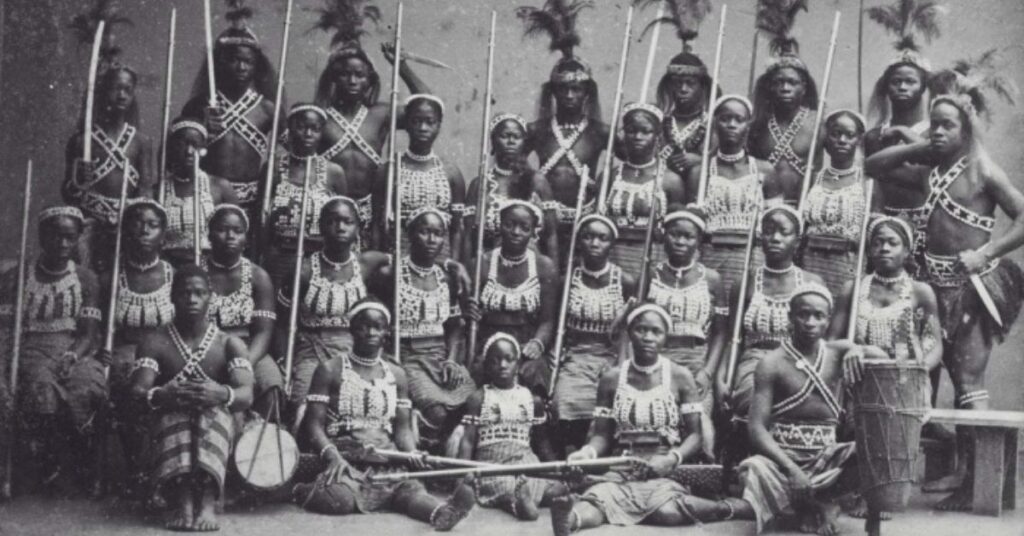Waiting for the new action movie The Woman King? Starring Viola Davis, the movie is inspired by true events that I just had to check out!
I was just going to geek out over this trailer (I love Viola Davis in things and here she’s kicking ass), but of course I went, “Dahomey…where do I know that from?” and had to look it up. (I’m posting this so I have some kind of fruit to my labors.) There are LOTS of people who know more about this than I do, though, so don’t take my word on it. I’ll be adding links below as I find them.
The Kingdom of Dahomey was an African kingdom that lasted from 1600 to 1904. If you click the image below, you will see a larger version that shows where Dahomey is (it’s relatively small and on the southern coast of Western Africa).

Because this debate is already coming up online, I’m going to mention here that Dahomey did participate in the slave trade; Dahomey was part of the “Bight of Benin” area listed below.
From Wikipedia’s article on the Atlantic Slave Trade:
Europeans would buy and ship slaves to the Western Hemisphere from markets across West Africa. The number of enslaved people sold to the New World varied throughout the slave trade. As for the distribution of slaves from regions of activity, certain areas produced far more enslaved people than others. Between 1650 and 1900, 10.2 million enslaved Africans arrived in the Americas from the following regions in the following proportions:[101]
- Senegambia (Senegal and the Gambia): 4.8%
- Upper Guinea (Guinea-Bissau, Guinea and Sierra Leone): 4.1%
- Windward Coast (Liberia and Ivory Coast): 1.8%
- Gold Coast (Ghana and east of Ivory Coast): 10.4%
- Bight of Benin (Togo, Benin and Nigeria west of the Niger Delta): 20.2%
- Bight of Biafra (Nigeria east of the Niger Delta, Cameroon, Equatorial Guinea and Gabon): 14.6%
- West Central Africa (Republic of Congo, Democratic Republic of Congo and Angola): 39.4%
- Southeastern Africa (Mozambique and Madagascar): 4.7%
Dahomey seems to have been singularly picked out as profiting from the slave trade, rather than one country amidst others who did so.
I’m not an expert, but the narrative that “Africans sold themselves into slavery!” sounds like nothing more than a handy excuse to justify having entire countries taken over and millions of people murdered, starved to death, or denied medical care.
If someone brings up a point about Dahomey being a nation of slavers and why would we have a movie about terrible people like that, my only response is: So was America. Please boycott the bajillion pro-slavery movies set in America before worrying about boycotting one movie about Dahomey.
Anyway…
The Kingdom of Dahomey had an all-female regiment, the Agoji, that Westerners nicknamed Amazons after (earlier) legends of the Amazons in Anatolia, or present-day Turkey. While other kingdoms had female guards or ceremonial troops, the Agoji were regularly used as combat troops.
Traditionally, the troops were said to be founded when teams of female hunters, or gbeto, were drafted by King Ghezo around 1850. However, a French slaver reported seeing female troops armed with spears in 1725, so maybe not.
Another contributing factor might have been Queen Hangbe, who briefly ruled from 1716-1718 after the death of her twin brother and was largely erased from the historical record after supporting her nephew for the throne instead of her (victorious, power-hungry, and sexist) younger brother.
Men still ruled in Dahomey. Women who trained as Agoji were thought to no longer be women and become men, generally at the time they disemboweled an enemy.
The titular character of The Woman King appears to be Nanisca, who was recorded in 1889 as not yet having killed anyone; however, the story is more likely to focus on earlier events, that is, during the reign of King Ghezo, who ruled Dahomey from 1818-1859.
While there was no “woman queen,” strictly speaking, of Dahomey, each position in the royal court had a female counterpart or advisor, just as their religion had male and female gods.
Alas, Dahomey was taken down during the rabid colonial expansion after 1880 by the French, with the Agoji mowed down by superior French weaponry. The last known surviving Agoji is said to be a woman named Nawi, coincidentally one of the characters from The Woman King, and who died in 1979.
The Woman King is not the first time fictionalized Agoji have appeared in recent popular culture. Agoji were used as an inspiration for the Dora Milaje in the Black Panther movie and comic book series (you can read more about the inspirations for Wakanda and the rest of the Black Panther movie elements here.)
The Woman King is scheduled for release on September 16, 2022, and I’m looking forward to it!
Here’s where I’d heard of Dahomey before: Sir Richard Francis Burton, noted explorer and intelligence gatherer, traveled to Dahomey in the 1860s, supposedly to persuade the nation to end its slave trade. He wrote a book, A Mission to Gelele, King of Dahomey, about the area. Caution: the book appears to be more than usually racist, even for Burton. (I like Burton as a character, but wow was he an industrial-strength egotist and asshole.)
More articles!
- An article from Afropunk: “Dahomey Amazons Were Bad-Ass African Warriors.”
- “The Last Stand of Dahomey’s Female Amazons,” at History Today.
- “The Legend of Benin’s Fearless Female Warriors,” at BBC Travel. Contains a photo of modern-day descendants.
- “Dahomey’s Women Warriors,” at Smithsonian Magazine.


